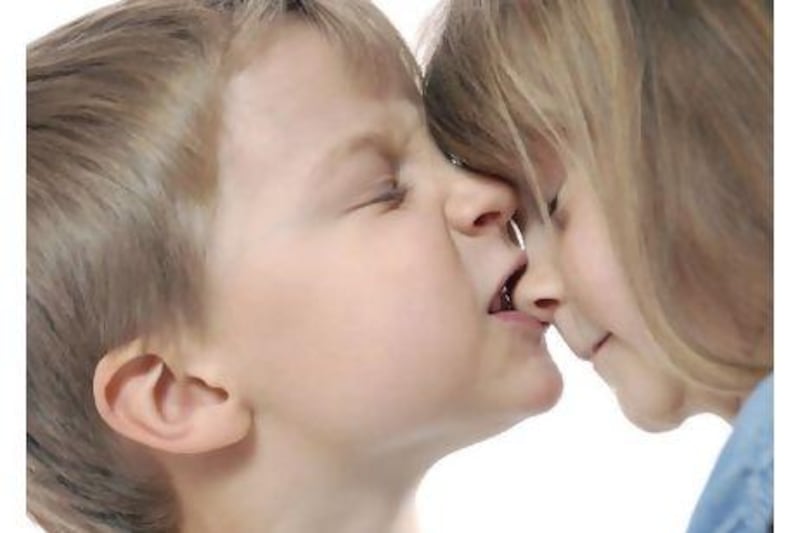A shove, a kick, even a punch... almost nothing compares to the unforgivable bite. Any parent whose child has bitten another at playschool or nursery knows that little can mitigate the shame. As a high-pitched scream reverberates around the room and a plump little arm throbs with incriminating teeth marks, all a guilty parent and child can do is hope the soft toys will swallow them up. It doesn't matter what's gone before, whether your child was taunted, pinched, cajoled or pushed: he or she has now bitten and there is no defence.
Once you're away from the situation, it's only natural to wonder why your little darling behaved in such a monstrous fashion. Reassuringly, the British child psychologist Lyn Fry says that up to a quarter of children are guilty of the odd chomp. "The main reason for biting is attention-seeking," she says. "The second most common reason is anger, when children find it difficult to express themselves."
While you may harbour fears of losing all your mummy friends and raising a little cannibal, there are steps you can take to prevent such disasters in future - and it's all about consistency. "If a child bites, you have to take immediate action," says Fry. "Parents become pariahs when they do nothing about it."
Addressing your child's animalistic tendencies won't be easy, but the wounded party will appreciate your efforts. The key, apparently, is to keep the punishment short and sweet. "Don't talk to your child at great length," advises Fry. "It's a time for action, not words. If you spend ages reasoning with your child you will be rewarding their bad behaviour with spades of attention."
Interestingly, it seems that a small child isn't overly discerning when it comes to positive or negative attention: they're simply pleased to be at the centre of it all. Fry suggests you say: "We do not bite," and then remove your child from the situation. They will soon get the message. By switching all your attention to the bitten child, showering concern and sympathy, you will help to reinforce this message. To beat the biting, you need to stick with this plan of action. "You need attention, energy and consistency," says the British family therapist David Spellman. "These methods aren't rocket science, but they need planning and determination."
Once your blushes have started to fade, it helps to think about why it happened. There's no point in asking Biting Bobby, who won't be able to articulate his feelings, but try to think back over the situation. Was there a fight over a toy? If so, spend some time teaching him how to deal with such a situation.
Encourage him to ask: "Can I play with your ball?" and next time he's playing nicely, give him lashings of attention. Oddly enough, some toddlers bite as a way of showing love - which means parents tend to be the main victims. Others are simply experimenting, while some might be teething. Whatever the motivation, a child must be told immediately that biting is a big no-no.
The old-school method of biting back has fallen from favour with nearly all experts. Some parents swear by its effectiveness - it's a quick lesson in the pain inflicted on the other child - but it also teaches that violence is solved with violence. And if Mummy bites, why shouldn't I? While removing your child from the situation might take a bit longer to be effective, it should do the trick.
It's no fun being the parent of a biter, but it's equally unpleasant to see your child with tears streaming down his face while he nurses a set of angry teeth marks. When this happens your job is to comfort your own child and not to worry about the guilty party. The latest vogue in parenting means that an embarrassed mother will probably try to encourage her child to apologise for his behaviour - but don't feel you have to go along with this if your child is scared to be near the biter.
"I think this trend of forcing your child to say sorry is a huge mistake," says Fry. "As the parent of a biter, you're better off addressing the incident much later in the day, rather than giving your child heaps of attention while you try to cajole him into apologising.
"That evening you can say: 'You hurt Lucy, didn't you? What do you think you could've done to make it better?'" Fry suggests reading storybooks about biting and acting out scenes with dolls where one bites so you can suggest appropriate behaviour. The good news is that a biting habit is not thought to have any bearing on your child's future personality, which will be a relief to at least 25 per cent of us. Like most things in childhood, biting is a phase that will pass.
It's usually worst between the ages of two and three, but by the age of four most children have grown out of it and you should be able to start creeping back to your old mummy friends in the hope that the wounds have healed.










